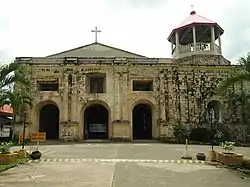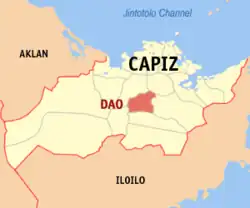Dao
Divingdin | |
|---|---|
| Municipality of Dao | |
 Church of Dao (St. Thomas of Villanova Parish Church) | |
 Flag  Seal | |
| Etymology: Dao | |
 Map of Capiz with Dao highlighted | |
OpenStreetMap | |
.svg.png.webp) Dao Location within the Philippines | |
| Coordinates: 11°23′40″N 122°41′09″E / 11.39444°N 122.68583°E | |
| Country | Philippines |
| Region | Western Visayas |
| Province | Capiz |
| District | 2nd district |
| Barangays | 20 (see Barangays) |
| Government | |
| • Type | Sangguniang Bayan |
| • Mayor | Ernesto P. Escutin |
| • Vice Mayor | Joselito Y. Escutin |
| • Representative | Fredenil H. Castro |
| • Municipal Council | Members |
| • Electorate | 22,990 voters (2022) |
| Area | |
| • Total | 88.64 km2 (34.22 sq mi) |
| Elevation | 34 m (112 ft) |
| Highest elevation | 291 m (955 ft) |
| Lowest elevation | 5 m (16 ft) |
| Population (2020 census)[3] | |
| • Total | 33,842 |
| • Density | 380/km2 (990/sq mi) |
| • Households | 8,333 |
| Economy | |
| • Income class | 4th municipal income class |
| • Poverty incidence | 6.58 |
| • Revenue | ₱ 122.2 million (2020) |
| • Assets | ₱ 147.7 million (2020) |
| • Expenditure | ₱ 120.5 million (2020) |
| • Liabilities | ₱ 46.85 million (2020) |
| Service provider | |
| • Electricity | Capiz Electric Cooperative (CAPELCO) |
| Time zone | UTC+8 (PST) |
| ZIP code | 5810 |
| PSGC | |
| IDD : area code | +63 (0)36 |
| Native languages | Capiznon Hiligaynon Tagalog |
| Website | www |
Dao, officially the Municipality of Dao (Capiznon/Hiligaynon: Banwa sang Dao; Tagalog: Bayan ng Dao), is a 4th class municipality in the province of Capiz, Philippines. According to the 2020 census, it has a population of 33,842 people.[3]
Dao is 32 kilometres (20 mi) from Roxas City.
History
Dao was incorporated as a municipality following the founding of Capiz Province in 1901. It was invaded by the Japanese 41st Infantry Regiment as part of their Panay operation on 16 April 1942.[5] In 1957, the barrio of Nasuli-B was renamed to Santo Tomas.[6]
Geography
Barangays
Dao is politically subdivided into 20 barangays. [7] Each barangay consists of puroks and some have sitios.
- Aganan
- Agtambi
- Agtanguay
- Balucuan
- Bita
- Centro
- Daplas
- Duyoc
- Ilas Sur
- Lacaron
- Malonoy
- Manhoy
- Mapulang Bato
- Matagnop
- Nasunogan
- Poblacion Ilawod
- Poblacion Ilaya
- Quinabcaban
- Quinayuya
- San Agustin (Ilas Norte)
Climate
| Climate data for Dao, Capiz | |||||||||||||
|---|---|---|---|---|---|---|---|---|---|---|---|---|---|
| Month | Jan | Feb | Mar | Apr | May | Jun | Jul | Aug | Sep | Oct | Nov | Dec | Year |
| Mean daily maximum °C (°F) | 27 (81) |
28 (82) |
29 (84) |
31 (88) |
32 (90) |
31 (88) |
30 (86) |
30 (86) |
29 (84) |
29 (84) |
29 (84) |
27 (81) |
29 (85) |
| Mean daily minimum °C (°F) | 23 (73) |
23 (73) |
23 (73) |
24 (75) |
25 (77) |
25 (77) |
24 (75) |
24 (75) |
24 (75) |
24 (75) |
24 (75) |
23 (73) |
24 (75) |
| Average precipitation mm (inches) | 61 (2.4) |
39 (1.5) |
46 (1.8) |
48 (1.9) |
90 (3.5) |
144 (5.7) |
152 (6.0) |
145 (5.7) |
163 (6.4) |
160 (6.3) |
120 (4.7) |
90 (3.5) |
1,258 (49.4) |
| Average rainy days | 12.3 | 9.0 | 9.9 | 10.0 | 18.5 | 25.0 | 27.4 | 26.0 | 25.9 | 24.9 | 17.9 | 14.2 | 221 |
| Source: Meteoblue (modeled/calculated data, not measured locally)[8] | |||||||||||||
Demographics
| Year | Pop. | ±% p.a. |
|---|---|---|
| 1903 | 6,694 | — |
| 1918 | 17,116 | +6.46% |
| 1939 | 13,886 | −0.99% |
| 1948 | 13,706 | −0.14% |
| 1960 | 16,624 | +1.62% |
| 1970 | 18,535 | +1.09% |
| 1975 | 21,052 | +2.59% |
| 1980 | 23,921 | +2.59% |
| 1990 | 29,156 | +2.00% |
| 1995 | 29,266 | +0.07% |
| 2000 | 30,623 | +0.98% |
| 2007 | 31,420 | +0.36% |
| 2010 | 31,911 | +0.57% |
| 2015 | 32,496 | +0.35% |
| 2020 | 33,842 | +0.80% |
| Source: Philippine Statistics Authority[9][10][11][12] | ||
In the 2020 census, the population of Dao, Capiz, was 33,842 people,[3] with a density of 380 inhabitants per square kilometre or 980 inhabitants per square mile.
Economy
Culture
Attractions
Dao has sites that are well known among natives and are tourist spots alike.[20] These include:
- Sto. Tomas de Villanueva - local parish church
- Lolets Eco Park - a natural park with a resort
Festivities
The people of Dao celebrate festivals, sometimes along with other regions of the province, in events like:
- Pasalamat Festival
- Halaran Festival, although mostly held in Roxas City[21]
Notable personalities
- Jocelyn Bolante is the son of Salvacion Isada and Vicente Bolante. He is the former Undersecretary of the Department of Agriculture and alleged mastermind of the 2004 Fertilizer Fund Scam. However, in a decision promulgated by the Supreme Court on April 17, 2017, he was acquitted on the ground of insufficiency of evidence and it was found out that he was not a member of the Board of Trustees of LIVECOR for 14 months before the latter even made the initial transaction, which was the subject of the suspicious transaction reports. Furthermore, according to the Audit Report submitted by the Commission on Audit, no part of the Php 728 million fertilizer fund was ever released to the LIVECOR. The accusations made against him is considered as a political humiliation by the Aquino administration.
References
- ↑ Municipality of Dao | (DILG)
- ↑ "2015 Census of Population, Report No. 3 – Population, Land Area, and Population Density" (PDF). Philippine Statistics Authority. Quezon City, Philippines. August 2016. ISSN 0117-1453. Archived (PDF) from the original on May 25, 2021. Retrieved July 16, 2021.
- 1 2 3 Census of Population (2020). "Region VI (Western Visayas)". Total Population by Province, City, Municipality and Barangay. Philippine Statistics Authority. Retrieved 8 July 2021.
- ↑ "PSA Releases the 2018 Municipal and City Level Poverty Estimates". Philippine Statistics Authority. 15 December 2021. Retrieved 22 January 2022.
- ↑ "World War 2 Related Events for April 16, 1942". ww2timelines.com. Archived from the original on 11 March 2016. Retrieved 12 January 2022.
- ↑ "An Act Changing the Name of the Barrio of Nasuli-B in the Municipality of Dao, Province of Antique, to Santo Tomas". LawPH.com. Archived from the original on 2012-05-15. Retrieved 2011-04-12.
- ↑ "Province: Capiz". PSGC Interactive. Quezon City, Philippines: Philippine Statistics Authority. Retrieved 12 November 2016.
- ↑ "Dao: Average Temperatures and Rainfall". Meteoblue. Retrieved 2 May 2020.
- ↑ Census of Population (2015). "Region VI (Western Visayas)". Total Population by Province, City, Municipality and Barangay. Philippine Statistics Authority. Retrieved 20 June 2016.
- ↑ Census of Population and Housing (2010). "Region VI (Western Visayas)" (PDF). Total Population by Province, City, Municipality and Barangay. National Statistics Office. Retrieved 29 June 2016.
- ↑ Censuses of Population (1903–2007). "Region VI (Western Visayas)". Table 1. Population Enumerated in Various Censuses by Province/Highly Urbanized City: 1903 to 2007. National Statistics Office.
{{cite encyclopedia}}: CS1 maint: numeric names: authors list (link) - ↑ "Province of Capiz". Municipality Population Data. Local Water Utilities Administration Research Division. Retrieved 17 December 2016.
- ↑ "Poverty incidence (PI):". Philippine Statistics Authority. Retrieved December 28, 2020.
- ↑ "Estimation of Local Poverty in the Philippines" (PDF). Philippine Statistics Authority. 29 November 2005.
- ↑ "2003 City and Municipal Level Poverty Estimates" (PDF). Philippine Statistics Authority. 23 March 2009.
- ↑ "City and Municipal Level Poverty Estimates; 2006 and 2009" (PDF). Philippine Statistics Authority. 3 August 2012.
- ↑ "2012 Municipal and City Level Poverty Estimates" (PDF). Philippine Statistics Authority. 31 May 2016.
- ↑ "Municipal and City Level Small Area Poverty Estimates; 2009, 2012 and 2015". Philippine Statistics Authority. 10 July 2019.
- ↑ "PSA Releases the 2018 Municipal and City Level Poverty Estimates". Philippine Statistics Authority. 15 December 2021. Retrieved 22 January 2022.
- ↑ Capiz Official Website - http://capiz.gov.ph/index.php?option=com_content&view=article&id=49&Itemid=71
- ↑ Halaran Festival - https://www.hellotravel.com/events/halaran-festival
External links